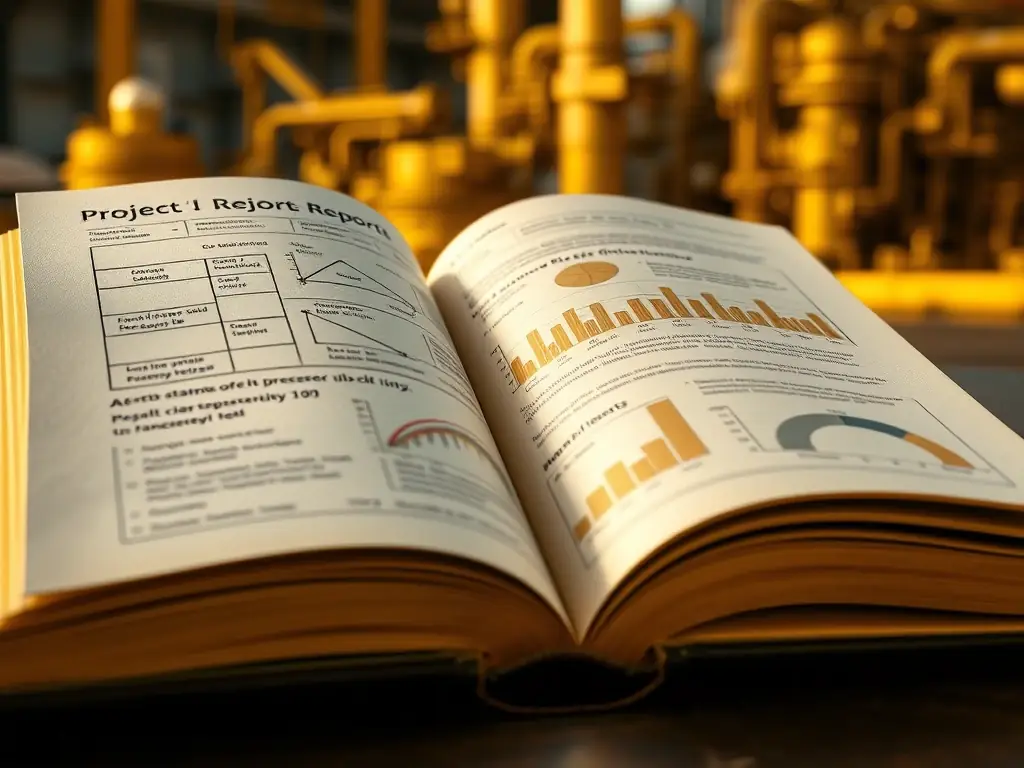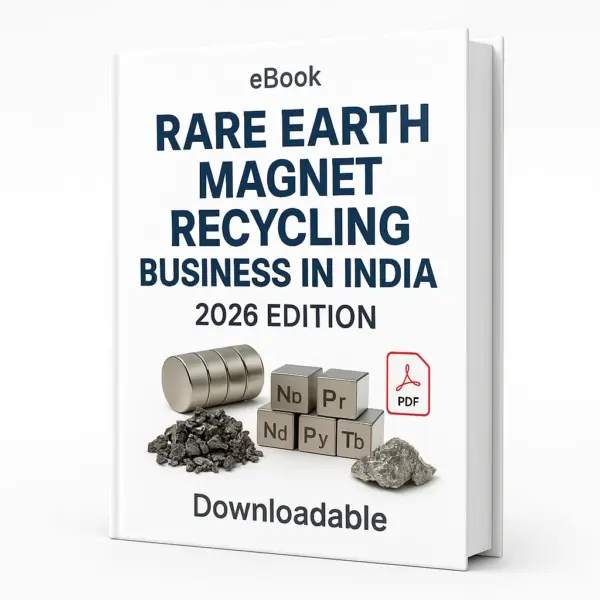Unlock India's Gold Refining Future
Unlock India's Gold Refining Potential
- Gain valuable industry insights
- Master investment strategies
- Navigate licensing and regulations
- Maximize profit potential
- Secure your future in gold refining
Table of Contents
The Future of the Gold Refining Business in India: Trends and Opportunities
Interested in starting a gold refining business in India? This article covers industry growth, key players, necessary licenses, and economic benefits to help guide your journey.
Key Takeaways
India’s gold refining industry has grown significantly, increasing from 300 tons in 2013 to approximately 1,800 tons by 2021, driven by rising gold prices and local production.
The market is fragmented with opportunities for consolidation, supported by government initiatives like the Revamped Gold Monetisation Scheme and the Startup India initiative.
Emerging technologies and sustainability trends are shaping the future of the gold refining sector, increasing efficiency while emphasizing responsible sourcing and eco-friendly practices.
Overview of the Gold Refining Industry in India

The gold refining industry in India is currently stabilizing after undergoing significant changes and challenges in recent years. Key points include:
The capacity of India’s organized gold refining sector has increased from 300 tons in 2013 to approximately 1,800 tons by 2021.
This marks a growth of 500%.
Growth is fueled by rising gold prices and local production of refined gold.
Recycled gold makes up 11% of the local annual gold supply in India. The lion’s share of recycled gold comes from old jewellery scrap, accounting for around 85% of the total scrap intake. Indian households play a significant role in the gold recycling market, as their gold holdings and changing consumer behaviors influence recycling trends. Key industry data and insights are provided by the World Gold Council, which plays an important role in market transparency and policy development.
The majority of Indian gold refineries have an annual capacity of less than 50 tons, with a total of 33 formal operations recorded by 2021. This indicates a fragmented market with significant potential for consolidation and growth. The gold refining industry is not only crucial for meeting domestic demand but also for positioning India as a key player in the global gold market. Efforts to recycle gold are influenced by industry standards, consumer behavior, and policy measures.
Growth Factors
Several factors contribute to the growth of India’s gold refining industry:
Advantageous import duty results in lower costs for refiners. Changes announced in the union budget and subsequent budget announcements have significantly influenced the growth and competitiveness of India’s gold refining industry.
A tax advantage through the duty differential between doré and refined bullion has positively impacted the industry’s growth.
Economic conditions, including fluctuations in gold prices, are critical drivers.
Rising consumer demand for ethically sourced gold.
Technological advancements.
Government initiatives such as the Revamped Gold Monetisation Scheme (R-GMS) and the Startup India initiative further support the sector.
Key Players
Key players in the gold refining industry, such as MMTC-PAMP, play a vital role in determining market dynamics and standards. MMTC-PAMP is recognized as the only refinery in India accredited by the London Bullion Market Association for both gold and silver. This accreditation signifies adherence to international standards, enhancing its reputation and boosting consumer confidence.
Importance of Starting a Gold Refining Business

Starting a gold refining business in India now is particularly favorable due to the current economic conditions, including rising gold prices and increasing demand. The gold refining industry offers significant economic benefits, such as contributing to the national GDP through increased industrial activity and creating substantial employment opportunities across various skill levels. For example, the amount of gold recovered from recycling a ton of mobile phones can exceed the gold extracted from a ton of traditional gold ore, highlighting the value of recovered gold in modern refining operations.
The market demand for gold, driven by cultural significance and investment value, continues to rise. This high demand, coupled with India’s potential to enhance its status as a key player in the global gold export market, makes it an opportune time to start a gold refining business.
The Startup India initiative also provides access to various funding options and mentorship programs, supporting new ventures in the sector.
Economic Benefits
Gold refining contributes significantly to the national economy, enhancing GDP through increased industrial activity. MSMEs in the sector are eligible for various schemes that enhance operational capabilities and market access.
Moreover, economic factors such as changes in gold prices and consumer sentiment significantly impact gold recycling volumes in India.
Market Demand
India’s gold import policy adjustments aim to stimulate demand for domestically refined products. The continuous rise in gold demand is driven by increasing investment from rapidly developing nations.
Opportunities for exporting refined bullion are enhanced by the growing global demand for high-quality gold bullion and silver products, positioning India as a key player in the global gold export market.
Types of Precious Metals You Can Refine

The gold refining industry primarily focuses on gold, but other precious metals such as:
silver
platinum
palladium
copper are also significant. These metals can be sourced from various industries, including:
electronics
jewelry industry
dental where scrap materials are generated.
Advanced recycling technologies are now able to recover critical metals such as lithium, cobalt, and nickel from used electronics and batteries, ensuring high purity standards and environmental safety.
Used electronics are a significant source of valuable materials that can be reclaimed to conserve resources and protect the environment.
Each of these metals has its own refining processes and market demand.
Gold
Gold is the most commonly refined precious metal due to its high value and demand. The refining process ensures the quality and purity of gold, which is essential for both domestic and international markets. Common techniques used in gold refining include chemical processes like aqua regia and electrochemical methods.
With the growing demand for high-quality refined gold, there are significant opportunities for expansion and innovation in gold refining practices to produce more gold.
Silver
Silver is another precious metal that is often refined, complementing gold in market demand and metal value. Electrochemical refining is a commonly used method for silver, where the metal is dissolved and deposited as pure metal on a cathode.
The potential of refining silver is significant and complements the gold refining industry, as both metals have important roles in various markets.
Other Valuable Metals
Other valuable metals such as platinum and palladium can also be refined. These metals are often used in jewelry and catalytic converters. Chemical refining involves processes like dissolving and precipitation, often used for complex materials that can’t be easily melted, including metal recovery.
Effective refining of these metals ensures they can be processed alongside gold, diversifying offerings in the market.
Step-by-Step Process of Refining Precious Metals

Refining precious metals involves transforming raw materials into pure valuable substances through several critical steps. The process starts with raw gold-bearing material collection. Printed circuit boards from end-of-life electronic products are a significant source of industrial scrap for gold recycling. Circuit boards from electronic waste are processed to recover valuable metals, including gold, during the refining process. Mobile phones are a major source of e-waste, containing valuable metals such as gold, silver, and copper, which can be recovered through refining. The process then continues with refining techniques and concludes with producing the refined product.
Each step is crucial for ensuring the purity and quality of the final product.
Raw Material Collection
The first step in the refining process involves:
Collecting raw materials, which can include scrap gold from various industries.
Small-scale setups typically process less than 25 kg of gold daily, requiring simpler equipment configurations.
Effective inventory management and reserve banking to maintain a steady supply of raw materials to extract gold.
Refining Techniques
Refining techniques play a crucial role in ensuring the purity and quality of gold. Aqua Regia and gold electrolysis are prominent methods used to separate gold from other metals, yielding high-purity results.
Automation and advanced processing technologies like AI and real-time tracking systems are increasingly being integrated into gold refining processes, improving accuracy and reducing downtime through predictive maintenance.
Final Product
The final stage in refining involves precise methods to ensure the gold produced meets high purity standards. The outcome of refined gold is typically a grain or bar that can reach purity levels of up to 99.999%.
Consistent quality is essential for maintaining market trust and meeting the demands of both domestic and international buyers.
Investment, Cost, and Profit Analysis
The total investment needed for a gold refining business varies significantly based on processing capacity and equipment technology. In 2023, India’s gold demand reached 747 tonnes, highlighting a substantial gap between demand and local production.
This section provides financial details for small, medium, and large-scale operations, helping you plan your business plan effectively, including an executive summary.
Small Scale Operations
Small-scale gold refining setups typically require an investment of approximately 10 to 20 lakhs, depending on equipment and location. The MSME sector offers financial assistance and support programs tailored for small and medium enterprises in the gold refining industry.
Training programs and workshops are provided to improve technical and managerial skills.
Medium Scale Operations
For medium-sized gold refining businesses, the investment may range between 20 to 50 lakhs, influenced by the processing capacity of the machinery used. This scale of operation allows for higher production volumes and greater market reach, balancing investment with potential returns.
Large Scale Operations
Large-scale gold refining operations require substantial initial capital investment due to the cost of technology and infrastructure. Operational costs include labor, utilities, and equipment maintenance, which can be substantial.
However, profit margins in large-scale gold refining can be significant, often exceeding those of smaller operations due to economies of scale. The potential return on investment is high, driven by increased efficiency and a growing market for refined gold.
Licenses and Registrations Required
Operating a gold refining business in India necessitates several licenses, including:
Import Export Code (IEC)
Registrations with the GST and other local authorities
A license from the Bureau of Indian Standards (BIS), which is essential to produce gold and silver bars.
Compliance with local and central regulations is crucial to legally refine gold.
MSME Registration
The MSME registration process can be completed online through the official government portal, making it accessible and straightforward for businesses. Registration on the Udyam portal facilitates easy access to various benefits, including tax exemptions and easier regulatory processes under the Startup India scheme.
BIS License
Obtaining a BIS license ensures that gold refining processes meet national quality standards. This license is essential for ensuring compliance with quality standards and is mandatory for gold and silver refiners to engage in trade with regulated exchanges.
It also enhances consumer trust and validates the quality of the refined products.
Government Schemes and Support
Government support is crucial for the growth and sustainability of the gold refining industry in India. MSME registration provides various benefits such as easier access to loans and government subsidies, which can significantly benefit gold refining startups.
Additionally, the Startup India initiative offers financial support and mentorship for new entrepreneurs entering the market.
MSME Support
The MSME sector plays a crucial role in promoting innovation and entrepreneurship within the gold refining industry. The government has established various support schemes targeted specifically at MSMEs, including financial aid through government grants and subsidies designed to reduce operational costs.
There are also training programs available that focus on enhancing the technical skills of MSME workers in the gold refining process.
Startup India
The Startup India initiative, launched by the Government of India, aims to foster innovation and support new ventures across the industry landscape. Within the context of the gold refining industry, this initiative provides:
Financial support
Mentorship
Tax exemptions
Regulatory reforms that reduce the barriers to entry
These measures encourage more startups in the gold refining sector.
Marketing and Sales Opportunities
The gold market offers numerous marketing and sales opportunities, particularly through digital marketing, which is becoming increasingly vital for selling precious metals. Combining traditional selling methods with digital platforms improves outreach for refined gold and silver sales, expanding market access.
Marketing strategies should focus on both domestic and export markets to maximize profit margins.
Domestic Market
Refined gold products are experiencing a surge in demand in the domestic market, driven by cultural and investment factors. Startup India promotes market access for startups, offering platforms to connect them with potential investors and collaboration opportunities within the gold refining sector.
More than 60% of sales in the domestic market come from the most e lion’s share of 5g and 10g minted products, with kilo bars becoming a preferred choice among Indian consumers due to their investment value.
Export Opportunities
There has been a significant rise in international demand for refined gold, especially from markets in Asia and Europe, including south india. India’s increasing refining capacity position india it well to meet this international demand.
Strategic partnerships with international buyers and financial institutions are essential for tapping into the global gold market, ensuring compliance with international standards and building networks with global stakeholders.
Environmental and Safety Compliance
Strict adherence to environmental regulations is essential for the sustainability of gold refining operations. Environmental and safety compliance measures are necessary for the refining process, ensuring that the impact on ecosystems is minimized and that worker safety is prioritized. The rapid adoption of electric vehicles in India is also contributing to the e-waste problem, making responsible recycling and metal recovery from these devices increasingly important for environmental sustainability.
Environmental Regulations
Gold refining processes contribute significantly to carbon emissions, with traditional mining operations generating over 126 million tonnes of CO2 annually. Compliance with local environmental laws is essential to control emissions of harmful substances during the refining process.
Sustainable practices, such as e waste recycling and adopting sustainable ways of eco-friendly refining methods, are increasingly important in the electronic waste industry.
Safety Measures
Implementing strict safety protocols in gold refining is crucial to protect workers from hazardous materials and potential accidents during the refining process. Proper personal protective equipment (PPE) is essential to safeguard workers, and effective ventilation systems prevent the accumulation of toxic fumes.
Effluent management is critical, requiring treatment of acidic waste before disposal to prevent soil and water contamination.
Challenges and Risk Management
Running a gold refining business comes with its own set of challenges and risks. Small-scale businesses often grapple with issues such as:
Limited access to finance, impacting their operational capacity and growth opportunities
Equipment malfunctions
High energy consumption
Maintaining compliance with regulatory standards
Market Fluctuations
Market fluctuations present a significant challenge in the gold market. Small-scale refineries encounter limited access to doré due to finance and operational scale, exacerbating the risks associated with fluctuating gold prices. Allowing nominated agencies and banks to import gold could provide a more stable supply and help mitigate risks related to gold price fluctuations.
Facilitating joint ventures with mining companies would help small and medium enterprises manage their gold supply more effectively in response to market changes, benefiting the company involved.
Operational Risks
Small-scale refineries in India experience operational risks due to their dependence on cash transactions and limited access to financing. High turnover rates among skilled technicians can adversely impact the efficiency of gold refining operations.
Regular health checks for employees and periodic training on proper use of personal protective equipment (PPE) are vital for ensuring worker safety.
Future Trends in Gold Refining

The future of the gold refining industry in India looks promising, driven by high demand for both domestic consumption and international exports. Emerging technologies are set to enhance operational efficiency and product quality significantly.
Compliance with environmental regulations is crucial to ensure the sustainable operation of gold refining processes.
Technological Advancements
Advancements in gold refining technologies are expected to enhance the efficiency and transparency of the refining process. Digital technologies, such as blockchain and cloud systems, are increasing transparency and traceability in the gold supply chain, including physical gold.
Nanotechnology is revolutionizing gold refining by allowing unprecedented control over separation and purification processes, achieving higher levels of purity and increasing energy efficiency, making it a game changer.
Sustainability Trends
The Indian gold refining industry is increasingly focusing on responsible sourcing practices in response to global sustainability pressures. There is a growing emphasis on eco-friendly refining practices, with companies adopting methods that reduce harmful emissions and promote resource recycling.
Modern gold refineries are adopting eco-friendly practices like closed-loop systems and non-toxic chemicals to minimize environmental impact.
Summary
In summary, the gold refining industry in India presents significant opportunities for growth and profitability. With rising gold prices, supportive government policies, and increasing demand for high-quality refined gold, now is an opportune time to enter this lucrative sector. By understanding the market dynamics, refining processes, and regulatory requirements, entrepreneurs can position themselves for success in this evolving industry. Embrace the future of gold refining in India and be part of a sustainable and profitable venture.
Frequently Asked Questions
Which gold refinery is best in India?
The best gold refinery in India is known for its advanced systems that achieve 99.99% purity and has an annual capacity of 217 metric tonnes. Their expertise in refining raw gold into marketable products sets them apart in the industry.
How much is 1 kg gold bar in India?
The price of a 1 kg gold bar in India varies by purity and current market rates. For the most accurate figure, it’s best to check the latest prices from reliable financial news sources or local jewelers.
What are the key growth factors for the gold refining industry in India?
The gold refining industry in India is primarily driven by advantageous customs duties, tax benefits from duty differentials, increasing demand for ethically sourced gold, technological advancements, and supportive government initiatives. These factors collectively enhance the industry’s growth potential.
What licenses are required to start a gold refining business in India?
To start a gold refining business in India, you need to obtain an MSME registration, a BIS license for producing gold and silver bars, and also register for an Import Export Code (IEC) and GST. Ensuring these licenses are secured is crucial for compliance and successful operation.
How much investment is required for a small-scale gold refining business?
A small-scale gold refining business generally requires an investment of about 10 to 20 lakhs, influenced by factors such as equipment and location. Prioritize your budget based on these variables to ensure a viable setup.
Unlock the Secrets to Gold Refining Success

Industry Trend Analysis

Investment Opportunities

MSME Growth Strategies
-

eBook AI Manufacturing Ideas
₹500 -

eBook White Label Business
₹500 -

eBook Indian Jewellery Business
₹500 -

eBook Imitation Jewellery Business
₹500 -

eBook Diamond Gemstone Jewellery
₹500 -

eBook Jewellery Franchise
₹500 -

eBook Jewellery Export
₹500 -

eBook Lab Grown Diamond
₹500 -

eBook Medical Devices Manufacturing
₹500 -

eBook Ayurvedic Cosmetic
₹500 -

eBook 3D Printing Business
₹500 -

eBook Rare Earth Magnet Recycling
₹500 -

eBook Gold Refining Business
₹500 -

eBook Drone Parts Manufacturing
₹500 -

eBook Moduler Funiture
₹500 -

eBook on Future of Agribusiness
₹500

















